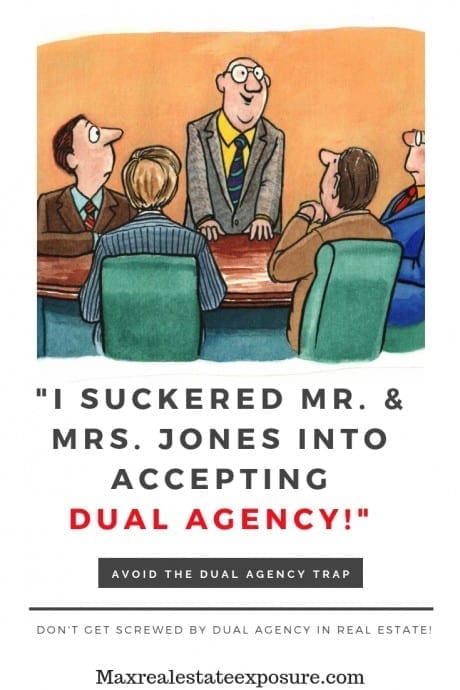 Did you know that dual agency is illegal in some states? There is one perfect reason why dual agency has been made illegal in some places – it sucks for consumers!
Did you know that dual agency is illegal in some states? There is one perfect reason why dual agency has been made illegal in some places – it sucks for consumers!
Do you want your Realtor to represent your best interests? How about getting the lowest price when buying or the highest price when selling?
Sorry, friends, but that can’t happen when you participate in dual representation. That’s precisely why some states have forethought to make it illegal.
Dual agency is bad for buyers and sellers. When I say dual agency, I refer to one agent representing the buyer and the seller in a transaction.
In some states, dual agency can mean two agents working for the same company, each representing a buyer and seller. Often referred to as a designated agency.
Designated and dual agency are very different, despite what some pundits will argue.
With a designated agency, both the buyer and seller have a representative. The agent truly “represents” the respective buyer or seller. In dual agency, that is not the case!
The topic of dual agency stirs many opinions among the real estate community. Some real estate agents are dead set against it. Others say there is absolutely no problem with it.
Having been a Realtor for almost thirty-eight years, I can say that many real estate agents and consumers have no idea how dual agency works. From years of experience, there are more issues with this form of agency.
Keep reading, and you will find out which states have made dual agency illegal and why you should never accept having a dual agent. Home sales are better off without it.
What is Dual Agency?
In dual agency, a Real Estate agent functions as both a buyer’s and seller’s agent during a transaction. The agent is positioned to act on behalf of both the buyer and seller.
Unfortunately, the only party that benefits from this arrangement is the real estate agent.
Dual agency is distinctly different than conventional real estate sales. Typically, buyers will interact with an agent who acts on their behalf to secure a house with the best possible terms.
Likewise, an agent representing a seller (listing agent) will work on their behalf to maximize what they realize from the sale.
It’s impossible for a real estate agent in dual agency to maximize both party’s interests. Read the reference above to understand why states have made the practice illegal.
It’s no different than why an attorney cannot represent a plaintiff and defendant in a lawsuit. When signing a listing agreement, a seller will either consent to it or not.
Potential home buyers will do the same when they execute a buyer’s agency agreement. The best agents thoroughly explain the ramifications.
Following Agency Laws Properly
Most real estate agents understand the basics of agency law. If you are a seller’s agent, you present the seller. If you are a buyer’s agent, you represent a buyer. Simple enough.
When dual agency arises, many real estate agents either ignore the state’s laws or don’t know what they mean.
Those who say there is no problem with dual agency have no idea what the meaning of “represent” means or ignore its enormous significance.
Let me explain – When you are a seller’s agent, you become the seller’s fiduciary. You’re their trusted advisor. Everything you do should be in their best interests, even when it conflicts with yours. The same can be said for a buyer’s agent.
For real estate agents, this means counseling on price, negotiating in their best interests, advising on decisions such as home inspections, and many other things in a sale. These are the regular duties of a top-shelf real estate agent.
You are their confidant and someone they rely on for sound advice. When selling a home, there should be many reasons beyond procuring a buyer why someone would hire a real estate agent. Your wisdom and expertise should be a guiding force in any hiring decisions.
No consumer in the world goes into a relationship thinking the person they hired will not represent them.
Nobody Would Accept Having a Dual Agent if Explained Accurately
This concept either escapes many real estate agents who practice dual agency, or they don’t care. Most clients would NEVER accept dual agency if it were correctly explained. The problem is a significant percentage of real estate agents put an agency disclosure form in front of a buyer or seller and ask them to sign it.
There is no explanation of the ramifications of dual agency. It’s called winging it. There is no other way to describe this besides unprofessional behavior. It happens every day of the week.
Then, some will explain it. But guess what – do you think the agent comes out and says I won’t be able to offer you professional assistance like I would if I remained a seller’s agent. I think you can guess the answer.
Dual agency is the departure from a real estate agent’s regular duties because you no longer have the capacity to do what you would as a respective buyer’s or seller’s agent. Knowing who represents whom in a real estate transaction is essential for consumers.
There are excellent reasons why single-agent dual agency is illegal in some states. If you want to learn all the downsides of dual agency, read this resource!
Be a smart buyer or seller - educate yourself on the downsides of dual agency.Click To TweetWhat Kind of Real Estate Agent Are You?
 Single-agent dual agency is a choice. As a real estate agent, you should precisely explain how dual agency works when you sit with a buyer or seller.
Single-agent dual agency is a choice. As a real estate agent, you should precisely explain how dual agency works when you sit with a buyer or seller.
In every state across America, these discussions take place, as they are a legal requirement.
Here is the problem – the agent explaining dual agency has a vested interest in the client accepting it. What do you think happens when the agent and seller sit across from one another, and the dual agency discussion occurs?
If the word SUGARCOAT comes to mind, you would be right. Real Estate agents who practice dual agency don’t explain the downsides. Why would they? What salesman who wants dual agency would tell their client it sucks?
What agent will say, “Mr & Mrs seller, I want you to know that when the buyer makes an offer on your home, I can offer you ZERO help? I also want you to know that when the buyer presents a laundry list of home inspection items, don’t ask me for guidance.”
I am laughing right now. Folks, this is precisely why dual agency is so bad. Consumers are being fooled daily.
Putting an agency disclosure form from the local board and asking the client to sign it does not meet your duties.
Unfortunately, in the vast majority of sales, this is precisely what happens. The Consumer Federation of America recently surveyed consumers and found they are clueless about dual agency.
There is a reason why consumers don’t have a clue about dual agency. The person explaining it often is not up to speed on what they can and can’t do either, or frankly, they are unethical.
This article at Active Rain is more evidence of a lack of understanding about dual agency from so many real estate agents. Disclosure without explanation is unacceptable.
The best real estate agents never make money as a basis for their decisions. They always put their client’s best interests first. Practicing dual agency is a function of greed — the everlasting desire to make money the basis of sensible decision-making.
Dual agency is one of the ways real estate agents fool their clients. Don’t be one of them.
It Almost Always Starts With The Seller
There will always be that real estate agent who tries to defend dual agency by saying, “What if I already have a buyer I’m working with, and I list a house that matches what they want?”
On that rare occasion when this scenario pops up, there is nothing wrong with referring the buyer to another agent. You will get a referral fee if the sale takes place. No, it won’t be two sides of the transaction. You won’t make the same double commission, BUT that is one of the points here.
A real estate agent should never be in a position where making a home sale is the goal at all costs. That is precisely what happens in single-agent dual agency.
The only fiduciary in the transaction is the real estate agent. Take a good look in the mirror because what’s at stake isn’t offering the best guidance but instead a big fat real estate commission check.
And no – discounting the commission is not enough of a benefit for a consumer to accept dual agency. For a consumer, getting a two thousand dollar discount doesn’t make up for a ten thousand dollar mistake or more that could happen without guidance.
When consumers accept dual agency, that is what happens. Usually, one party comes out on the short end of the stick. So, if I said you could save $2000 in commission, but you’re going to overpay by $10,000, would that sound appealing? I hope not!
That, unfortunately, happens every day in states where practicing dual agency is legal.
Listening to Agents Arguing For Dual Representation Can Be Sickening
 When articles like this one are written, there will always be real estate agents who proudly proclaim there is nothing wrong with dual agency – after all, it is legal.
When articles like this one are written, there will always be real estate agents who proudly proclaim there is nothing wrong with dual agency – after all, it is legal.
They will then say they are “the bomb,” and nobody can do their job better than they can. My eyes are now rolling.
They will then argue how “fair” they can be to both parties — again laughing. Of course, a real estate agent can be fair. You can’t, however, get what’s best for both clients.
Real Estate agents who get this fact take fiduciary responsibility seriously. They want the absolute best deal for their clients. Not just what’s “fair.”
It’s impossible to get the best deal for both buyer and seller simultaneously. You can’t serve two masters when there is a conflict of interest!
Also, giving both clients advice is ILLEGAL. Unfortunately, with dual agency, this also happens all the time. Again, doing whatever it takes to make the sale happen.
There are good reasons real estate agents who practice dual agency often end up in lawsuits!
Some Consumers Want to Work Directly With The Listing Agent
In the vast majority of cases, dual agency starts with the seller. An agent will get interviewed by a prospective seller to put their home on the market.
The agent, by law, is required to explain dual agency. The real estate agent declares their intentions on dual agency. Either the agent practices it, or they don’t.
If you are selling your home, you NEVER want your agent to be unable to represent you.
What about the buyer who goes directly to the listing agent because they don’t want a middleman? Some buyers prefer to work directly with the seller’s agent.
Well, guess what – there is nothing wrong with that. YOUR agent can work with a buyer and still be a seller’s agent ONLY BEHOLDEN TO YOU! Your real estate agent must NOT become a dual agent to work with the buyer.
Understanding this point is something significant that escapes most real estate agents. Why would you ever go from representing a seller – the person who hires and is paying you to become a neutral party? The answer is there is NO REASON!
An Agent Practicing it Should Be a Considerable Hiring Decision
 When selling your home, do you want an agent in your corner who is only concerned about what’s best for you? I hope you are shaking your head with a YES!
When selling your home, do you want an agent in your corner who is only concerned about what’s best for you? I hope you are shaking your head with a YES!
When you are going through an interview process for real estate agents, whether they practice dual agency or not should be a considerable hiring decision.
Do you want your real estate agent – the one you’re paying thousands if not tens of thousands to become a neutral party? Do yourself a favor and cross that kind of agent off your list.
Working with someone who is self-centered and only cares about their paycheck can come back to haunt you in more ways than one.
Do You Put Commission Before Your Client’s Interests?
Dual representation offers no benefits for consumers. So, what kind of real estate agent do you want to be? You have a choice. Do the right thing and reject dual agency.
I would not be surprised if more states made dual agency illegal in the future.
For an industry that talks about the vital importance of ethics, dual agency flies in the face of that.
Lots of people are getting fooled by dual agency. There needs to be better educational efforts on this subject.
Without proper training, consumers suffer from it. Just because something is legal doesn’t mean it’s okay.
What States Have Made Dual Agency Illegal?
By now, you know that dual agency is illegal in some states. It’s true. Realizing that dual agency does nothing to protect the consumer’s interests has become a reality in some places.
The following states have been intelligent enough to realize the practice of dual agency should be illegal. Here is where you cannot be a dual agent:
- Alaska
- Colorado
- Florida
- Kansas
- Maryland
- Texas
- Vermont
- Wyoming
Frankly, dual agency should be banned everywhere in the US. Several consumer groups are pushing for dual agency to be abolished. It doesn’t take a rocket scientist to determine why dual agency is illegal in some states.
9 Interesting Statistics Consumers Should Know
FAQs
Who enforces rules regarding dual representation?
Each state’s Real Estate Regulatory Authority (RERA) enforces the rules. RERA is a government body established to regulate and oversee the real estate industry, ensuring fair practices and protecting the interests of both buyers and sellers.
They can investigate any complaints or violations related to an agency relationship and take appropriate action against the offending parties. Through their diligent enforcement efforts, RERA aims to maintain transparency and integrity in real estate transactions across the country.
They uphold agency laws for a brokerage, ensuring consumers’ interests are protected in a purchase and sale.
What are the potential consequences of engaging in the practice in illegal states?
Engaging in dual representation in states where it is illegal can have severe consequences for both real estate agents and their clients. From a legal standpoint, the agent may face hefty fines and penalties for violating the state’s laws and regulations.
Additionally, the agent’s professional reputation may be tarnished, leading to a loss of trust from potential clients. Clients involved in real estate transactions will be disadvantaged if their agent is not negotiating in their best interests. It creates conflicts of interest and compromises their representation when they don’t act as a fiduciary.
For example, a lack of obedience, loyalty, or confidentiality could impact the negotiation on a property.
This could result in unfavorable outcomes, such as higher prices or missed opportunities. The bottom line is that agent neglecting their fiduciary duties is a severe violation in the real estate industry.
Is there any discussion to make it outlawed in more states?
There are ongoing discussions to make it forbidden in more states. Several states have recognized the potential conflicts of interest arising from this agency type and have enacted legislation prohibiting it.
However, other states are actively considering similar proposals, recognizing the importance of consumer protection and transparency in real estate transactions. These discussions aim to ensure that homebuyers and sellers receive unbiased representation and avoid potential conflicts when a single agent represents both parties.
By making the process illegal, these states are taking proactive measures to safeguard the interests of consumers and promote fair and ethical practices within the industry.
Who advocates for the ban on double agents?
Various consumer protection organizations and real estate industry experts advocate prohibiting dual agents. These advocates argue that dual agency poses inherent conflicts of interest, as it allows a single agent or brokerage to represent both the buyer and seller in a transaction.
They believe this arrangement can compromise the duty owed to each party, potentially leading to biased advice, reduced negotiation power, and unequal representation. Clients’ goals are at odds with one another, so it makes perfect sense.
To ensure transparency, fairness, and ethical practices in real estate transactions, these advocates push to prohibit dual agents.
How does a ban on it impact an agent’s earnings?
A ban can have some impact on real estate agent’s earnings. When this practice is banned, agents must choose one side to represent: the buyer or the seller. This restriction can limit their potential client base in a transaction.
Consequently, their earnings may decrease as they have fewer opportunities to earn commissions from both sides of a transaction.
However, it is essential to note that while a ban on double agents may initially affect earnings, it promotes transparency and avoids conflicts of interest, ultimately benefiting everyone in the industry. Some states have already figured this out.
Buyer clients will have exclusive representation, and so will the seller.
Final Thoughts
If you buy or sell a home, you should reject dual agency. Never work with a real estate agent who will put their interests ahead of yours. Get someone who is going to work hard every day for you.
If you are a real estate agent, hopefully, this article has sparked something in your brain that says, “Maybe Bill is correct, and dual agency isn’t something I should be endorsing.”
Please make no mistake; dual agency is bad for buyers and sellers. Hopefully, you better understand dual agency, how it works, and why some states have been smart enough to make it illegal.
Additional Helpful Real Estate Articles Worth Reading
- Home buying mistakes that are commonly made – Avoid some problems buyers put themselves in because they don’t know any better.
- Why you should have an agent when buying a new house – learn why going directly to the builder’s rep when buying new construction is a big mistake.
The above resources provide excellent guidance when buying or selling a home.
About the Author: The above Real Estate information on dual agency being illegal in some states was provided by Bill Gassett, a Nationally recognized leader in his field. Bill has expertise in mortgages, financing, moving, home improvement, and general real estate.
Learn more about Bill Gassett and the publications he has been featured in. Bill can be reached via email at billgassett@remaxexec.com or by phone at 508-625-0191. Bill has helped people move in and out of Metrowest towns for the last 37+ years.
Are you thinking of selling your home? I am passionate about real estate and love sharing my marketing expertise!
I service Real Estate Sales in the following Metrowest MA towns: Ashland, Bellingham, Douglas, Framingham, Franklin, Grafton, Holliston, Hopkinton, Hopedale, Medway, Mendon, Milford, Millbury, Millville, Natick, Northborough, Northbridge, Shrewsbury, Southborough, Sutton, Wayland, Westborough, Whitinsville, Worcester, Upton, and Uxbridge MA.


Wow! You are my brother from another Mother 🙂 you have perfectly articulated what I have believed to be true since entering real estate sales 7 yrs ago. I’ve never performed it, even as a new agent when every mentor and coach told me I was crazy for not.
I couldn’t wrap my head around it. My analogy to my sellers ( I only work with sellers and have a team who work with the buyers) I have two kids, one always thinks the other got the bigger scoop of ice cream and that’s pretty much how it will feel
going through with dual agency.
While it’s legal in my state, it is just something I am not comfortable with. Even if a buyer calls me
directly to show a home. If one of my agents is not available, I always explain I’m happy to show you the home but understand, I work for the seller.
If you have interest, you can see it again with your agent. If you do not have one, I’m happy to refer you to one. More recently I’m seeing buyers who do not want to be represented. In those cases, I require that they have an attorney.
I will not negotiate with a buyer directly. We are not an attorney state but I offer them 3 days attorney review. My sellers are ok with this because I explain that it is not in their best interest or mine to negotiate directly with the buyer.
Anna dual agency is one of my biggest pet peeves in real estate. The vast majority of agents don’t explain it well if at all. Consumers are being misled everyday of the week.
I will also mention that referring to a member of your team is not the best circumstances either as it is certainly possible your teammates have intimate knowledge of the seller’s situation.
When I explain roles and responsibilities to each client they are amazed at how many agents pitch representing Both (sellers and buyers) at open houses when a buyer is unrepresented. Should be part of every ethics required class as consumers have no idea what dual agency means to them. Taking advantage of people is not smart business.
Gilbert you are 100 percent correct. There are a significant percentage of agents who either have no idea how to explain dual agency properly, they don’t explain it at all or the sugarcoat what they can and can’t do when in this role.
Consumers need to be explained that a dual agent cannot by law give counseling and advice on the most crucial aspects of a real estate transaction.
It is a sad state of affairs that dual agency is still legal in so many states.